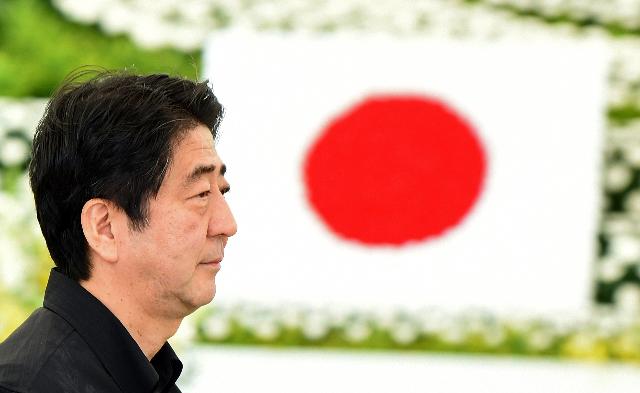Press Release

Prime Minister Shinzo Abe walks past a national flag made of flowers at a memorial service for those
who died in the battle of Okinawa during World War II at the Peace Memorial Park in Itoman on June 23, 2015.
(TORU YAMANAKA/AFP/Getty Images)
This post was co-authored with Brad Glosserman, executive director of Pacific Forum CSIS.
The Japan-South Korea relationship has been steadily improving in the run up to yesterday’s fiftieth anniversary of normalization. In recent weeks ministerial-level bilateral contacts have resumed between economic and defense ministers. The relationship has essentially normalized (and the U.S. State Department spokesperson wasted no time in welcoming these developments), but President Park Geun-hye and Prime Minister Shinzo Abe have yet to schedule a formal summit (although they have held informal encounters at the November 2014 APEC meeting in Beijing and on the occasion of Lee Kwan Yew’s funeral in Singapore earlier this spring).
The improvements have culminated in parallel events held to commemorate normalization in Tokyo and Seoul at which Prime Minister Abe and President Park both made positive comments about the future of the relationship. In an interview two weeks ago with the Washington Post’s Lally Weymouth, President Park suggested that progress was forthcoming on how to deal with the “comfort women” issue involving fifty living survivors of wartime sex slavery in Japan. But even if a bilateral Japan-South Korea summit meeting becomes possible, what can South Korea and Japan do to break the cycle of rapprochement and rupture that makes the relationship so volatile?
Recent polls sum up the good news-bad news picture of the relationship, affirming public support for the upturn in the relationship between the two countries while suggesting that the climb toward a truly stable and positive relationship is only getting steeper. The third annual Genron NPO-EAI (East Asia Institute) poll on Japan-South Korea relations released last month shows that large majorities in both countries have an unfavorable impression of each other, with 52 percent of Japanese viewing South Korea as unfavorable while 74 percent of South Koreans view Japan unfavorably. This result reveals a slight decrease in unfavorable views by the Japanese public toward South Korea and a slight increase in unfavorable views by the South Korean public toward Japan.
However, the Genron NPO-EAI poll also shows that at least two-thirds of the public in both countries perceive the worsening Japan-South Korea relationship to be “undesirable” or a “problem.” A recent Asan Institute poll of South Koreans concurs with this view and shows strong South Korean public support for a bilateral summit regardless of whether there is progress on history issues. The emergence of a pragmatic view of the need for a stable South Korea-Japan relationship despite continued differences on history has provided space for steps toward stabilization of relations.
Unfortunately, the Genron NPO-EAI poll also shows a hardening of public opinion on critical issues in the relationship. When asked what constitutes the greatest hindrance to development of the relationship, 88 percent of South Koreans and 62 percent of Japanese point to disputes over the disputed Dokdo/Takeshima island, while 63 percent of Koreans and 58 percent of Japanese identify the comfort women issue. While many Japanese pay less attention the island dispute (according to a Japanese Cabinet Office poll in late 2014), the territorial dispute between the two countries still looms as a major sticking point that the two governments have no clear way of addressing. Moreover, the level of Japanese awareness of the island dispute is growing, suggesting that it will be harder for the government of Japan to make concessions on this issue than before, even though Japan’s claim to the territory has been a longstanding source of public irritation in South Korea that is seen as a tangible symbol of Japan’s past territorial claim to the Korean peninsula.
In this respect, the Genron NPO-EAI polling results represent a potential setback to the viability of the bold “grand bargain” that Brad Glosserman and I have outlined in our book, The Japan-South Korea Identity Clash, for steps that would be necessary to provide long-term stability in relations between Japan and South Korea. Certainly, it means that South Korean and Japanese leaders will have a harder job if they decide to embrace the sort of joint partnership arrangement that we argue is manifestly in the interests of both countries as well as the United States. But in the absence of steps by both leaders to put the bilateral relationship onto a new footing, the current cycle will continue, and the relationship will be doomed to repeat the cycle of rising tensions, temporary rapprochement, and parallel rather than joint celebrations of the accomplishments between the two sides.